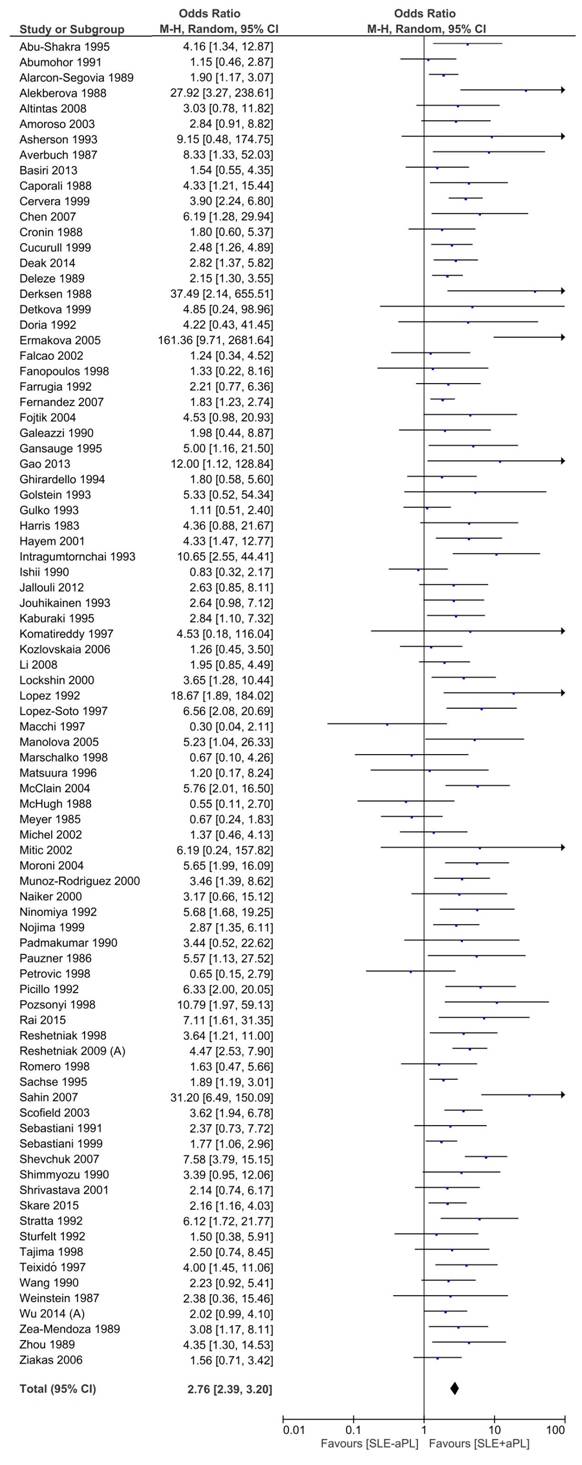Session Information
Session Type: ACR Poster Session C
Session Time: 9:00AM-11:00AM
Background/Purpose : Thrombocytopenia is present in patients with systemic lupus erythematosus (SLE), and the role of antiphospholipid antibodies (aPL) is controversial. Therefore our objective was to estimate the risk of thrombocytopenia associated with aPL in patients with SLE.
Methods : Studies were selected if they investigated the association between aPL and Thrombocytopenia in SLE patients and if aPL-negative patients were included for comparison. Data sources were Pubmed, Embase, Cochrane Library, hand search, congress abstracts, and reference lists of studies, without language restrictions. Risk estimates were independently extracted by 2 investigators. Pooled effect estimates were obtained by using the Mantel-Haenszel method (random effects).
Results: Of 2530 identified abstracts, 83 primary studies and 2 abstracts (24 cohorts, 18 case-control, 43 cross-sectional) met inclusion criteria, including 11877 SLE patients according to ACR criteria and 2399 cases of thrombocytopenia. Prevalence of thrombocytopenia in aPL-positive vs. aPL-negative SLE patients was 30.5% (n=1261/4128) vs. 14.7% (n=1138/7749), respectively. Compared with SLE patients without thrombocytopenia, the overall pooled odds ratios (OR) for thrombocytopenia in aPL-positive SLE patients was 2.76 (95% confidence interval [CI], 2.39-3.20) (Figure 1). The risk of thrombocytopenia was the highest for lupus anticoagulant (LA) (25 studies, OR=3.43 [95% CI, 2.59-4.54]). Risk of thrombocytopenia was also significantly increased in SLE patients with either IgG or IgM anticardiolipin antibodies (aCL) (27 studies, OR= 1.97 [95% CI, 1.58-2.44]; 17 studies, OR= 1.68 [95% CI, 1.34-2.12], respectively) and IgG or IgM anti-β2-glycoprotein I antibodies (5 studies, OR=2.04 [95% CI, 1.22-3.41]; 3 studies, OR=2.68 [95% CI, 1.44-4.99], respectively). Finally, while high titers aCL were associated with an increased risk of thrombocytopenia (3 studies, OR=3.86 [95% CI, 1.05-14.23]), low titers aCL did not reach statistical significance (2 studies, OR= 0.56 [95% CI, 0.12-2.64]).
Conclusion : In SLE patients, aPL-positivity is associated with a significant 2- to 4-fold increased risk for thrombocytopenia. These findings a) confirm that an aPL-related mechanism can contribute to thrombocytopenia in SLE patients and b) suggest that thrombocytopenia could be associated with aPL in SLE patients.
Figure 1
To cite this abstract in AMA style:
CHOCK YP, WAHL D, ZUILY S. Increased Risk of Thrombocytopenia Associated with Antiphospholipid Antibodies in Patients with Systemic Lupus Erythematosus: A Systematic Review and Meta-Analysis [abstract]. Arthritis Rheumatol. 2015; 67 (suppl 10). https://acrabstracts.org/abstract/increased-risk-of-thrombocytopenia-associated-with-antiphospholipid-antibodies-in-patients-with-systemic-lupus-erythematosus-a-systematic-review-and-meta-analysis/. Accessed .« Back to 2015 ACR/ARHP Annual Meeting
ACR Meeting Abstracts - https://acrabstracts.org/abstract/increased-risk-of-thrombocytopenia-associated-with-antiphospholipid-antibodies-in-patients-with-systemic-lupus-erythematosus-a-systematic-review-and-meta-analysis/

